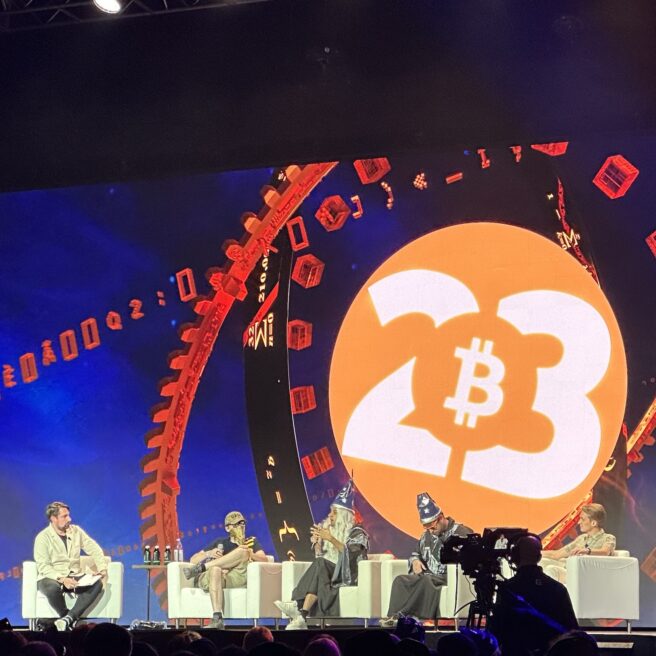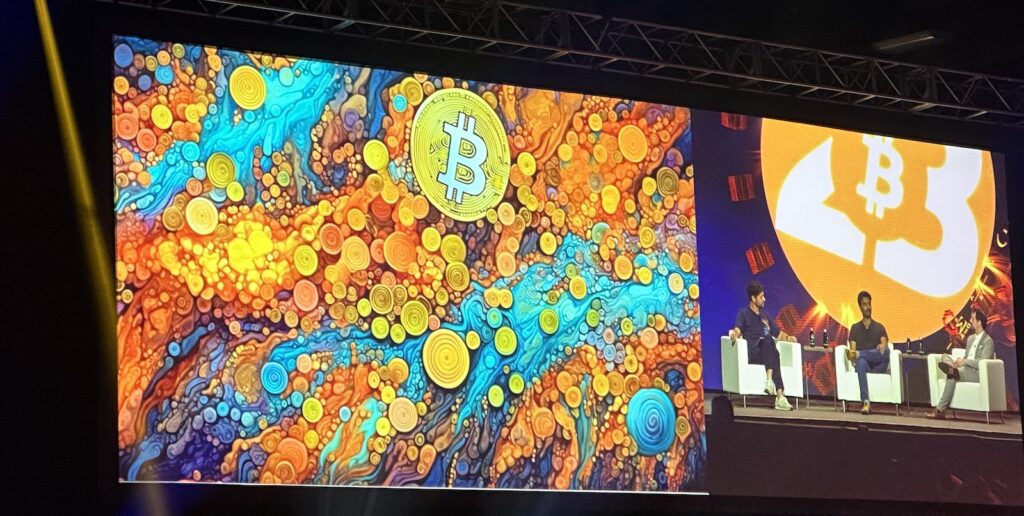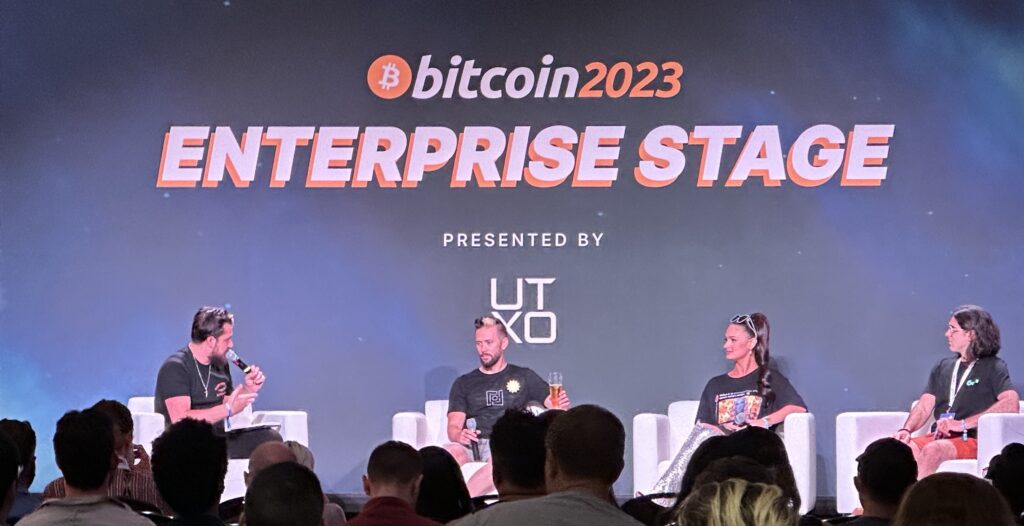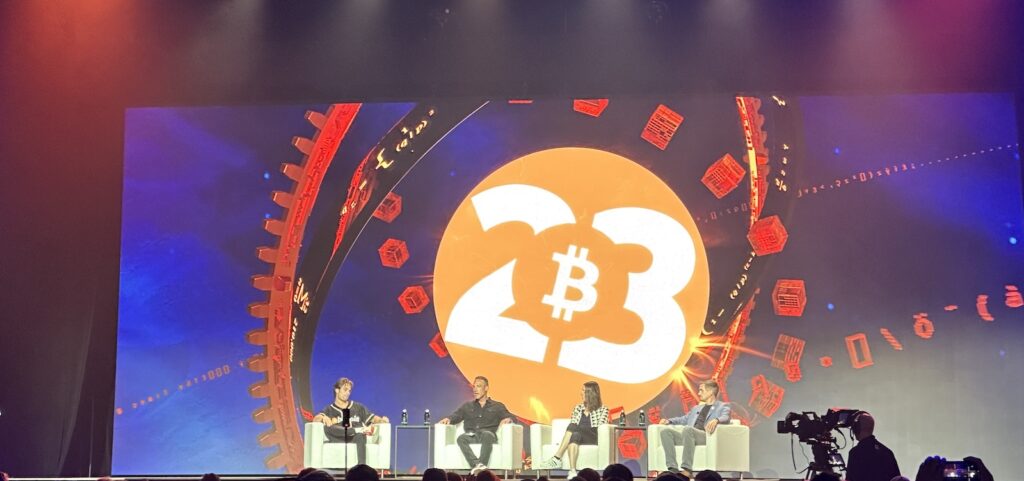

Bitcoin 2023 – Energized Wizards vs. Financial Freedom Activists
Future of Money
The leading Bitcoin conference in the world, Bitcoin 2023, transpired in Miami two 18-20 May. The event brought together 15000 Bitcoin entrepreneurs, thought leaders, and enthusiasts under the theme of the “Future of Money.” I was happy to represent Oivan at the event as an Industry Pass attendee.
Ironically, one of the unique elements of this year’s conference was the emerging use of the Bitcoin baselayer in nonmonetary use cases, such as NFTs (Non-Fungible Tokens) and minting speculative new tokens.
Bitcoin maximalists have long emphasized the importance of focusing on Bitcoin as the world’s most uncensorable, unstoppable, inclusive, immutable, and reliable digital money. The maximalists warmly welcome innovation if it adheres to the core principles of the Bitcoin white paper and advances the use of Bitcoin’s primary features in a faster, safer, smarter, and more private way. The second-layer payments technology Lightning, and visual scripting toolkit Miniscript are fantastic examples of these developments.
Early this year, some innovative developers, inspired by the trends familiar with the altcoin scene, discovered novel ways to use the Bitcoin base layer as an immutable database for NFTs (Non-Fungible Tokens) and speculative altcoin-like tokens. The technologies that allow these new use cases are called Ordinals and Inscriptions, and they are enabled by the Taproot upgrade to Bitcoin’s open-source code.

To this day, around 10 million Ordinal NFTs have been minted and stored in the Bitcoin base layer, filling up a large part of the Bitcoin networks’ intentionally small block space with nonmonetary data. The new demand for block space drove the Bitcoin baselayer transaction fees to unprecedented levels. In some blocks, the transaction fees provided bitcoin miners a higher bitcoin reward than the block subsidy of 6.25 BTC itself.
The quickly emerging trend caught the core Bitcoin community, focused on analyzing economic macro-trends and building monetary features through the current bear market, by surprise. Many Bitcoin maximalists have been openly critical of the ordinals and inscriptions phenomenon, proclaiming that the “unnecessary use” of the Bitcoin block space reduces the ability of Bitcoin users to do monetary transactions with reasonable fees.
One of the primary proponents of using Bitcoin for NFTS and digital tokens is the entrepreneur Udi Wertheimer, who navigated through the conference wearing a wizard hat to promote his Taproot Wizards project. He represented the emergent “Bitcoin as a builder’s playground” movement at the event with the Bitcoin core developer Eric Wall.
The panel discussion “The Great Ordinal Debate” was entertaining, moderated by Bitcoin Magazine’s Pete Rizzo and featuring Shinobi Monkey, Matt Corallo, Udi, and Eric. The Bitcoin “core-features-side” criticized using Bitcoin’s base layer for NFTS and speculative tokens. In contrast, the “Ordinals-are-fantastic-side” said this was the best thing that happened to Bitcoin in years. “We are making Bitcoin fun again” was their slogan, and at the end of the panel, a sizeable group of people dressed up as wizards danced next to the stage.
US Politicians Start Supporting Bitcoin
While my primary interest in Bitcoin is its potential to provide financial inclusion for the world, seeing this new kind of builder mentality spread inside the Bitcoin communities was interesting. In my speech at the BlockchainUA event in Kyiv in November 2021, I predicted that there will be a new NFT renaissance based on the unparalleled security and longevity of Bitcoin one day. It only took 14 months to become a reality.

Another fascinating theme at the conference was US politicians’ increasing interest in supporting Bitcoin. In fact, challenger presidential candidates from both sides proclaimed their support for Bitcoin. From the Democrat side, Robert F. Kennedy Jr. gave a speech about the importance of Bitcoin in maintaining a healthy balance between people’s privacy rights and government oversight. From the Republican side, Vivek Ramaswamy focused on how Bitcoin adheres to the constitutional values of the United States.
Bitcoin has sparked a vibrant creator economy, and the panel featuring the Bitcoin technical knowledge educator BTCsessions and the popular meme artist Carla shared their views on the creator economy. The growing explicit or implicit censorship of Bitcoin-related content in mainstream social media was a hot topic, and the promising emergence of the decentralized social media protocol Nostr, supported by the ex-CEO of Twitter, Jack Dorsey, was highlighted as a positive development.
Macroeconomics and Sustainability
Many panels discussed the macroeconomic landscape of the past 12 months, including the implosion of crypto-focused companies and American and European banks. Most speakers predicted that sometime in the next two years the Fed will pivot and start Quantitative Easing again. But in the meanwhile, there might be some significant volatility as the resolution of the debt ceiling debacle will drain some liquidity of the markets, at least for the short term.
The growing impact of Bitcoin mining to incentivize sustainable energy production was one of the primary topics of the talks and panels. Year after year, Bitcoin mining has become more sustainable by capturing and utilizing the flared methane from oil fields and organically bankrolling hydro, wind, and solar energy development at stranded locations.

The panel, “Will AI Dream of Electric Bitcoin,” explored the intersection of AI applications and Bitcoin. The speakers Tuur Demeester and Dhruv Bansal, moderated by Nolan Bauerle, took a primarily positive outlook on the future of AI, and pointed out that once AIs become more autonomous in taking care of business processes, it is natural that they use a native digital currency, Bitcoin, when dealing with “each other.” Mr. Demeester also introduced the novel idea that Bitcoin private keys will be the way that we can define where one AI ends and another begins.
Final Words
From Oivan’s business perspective, we made many fantastic contacts and started discussions around the Hatch Bitcoin White-Label Savings product and our broader digital transformation and cybersecurity expertise.
One of the big announcements at the conference was the news that after three years in Miami, the event will move to Nashville, Tennessee, in 2024. As a hobby musician, I hope to make it to America’s country music capital next year’s July and network with the vibrant Bitcoin community once again.
You can watch the panels from the 2023 event for free here: https://www.youtube.com/@BitcoinMagazine/playlists
More Information
Would you be interested in knowing more about this topic? Please feel free to contact me.
Rami Korhonen
CEO, Oivan Group
rami.korhonen@oivan.com
